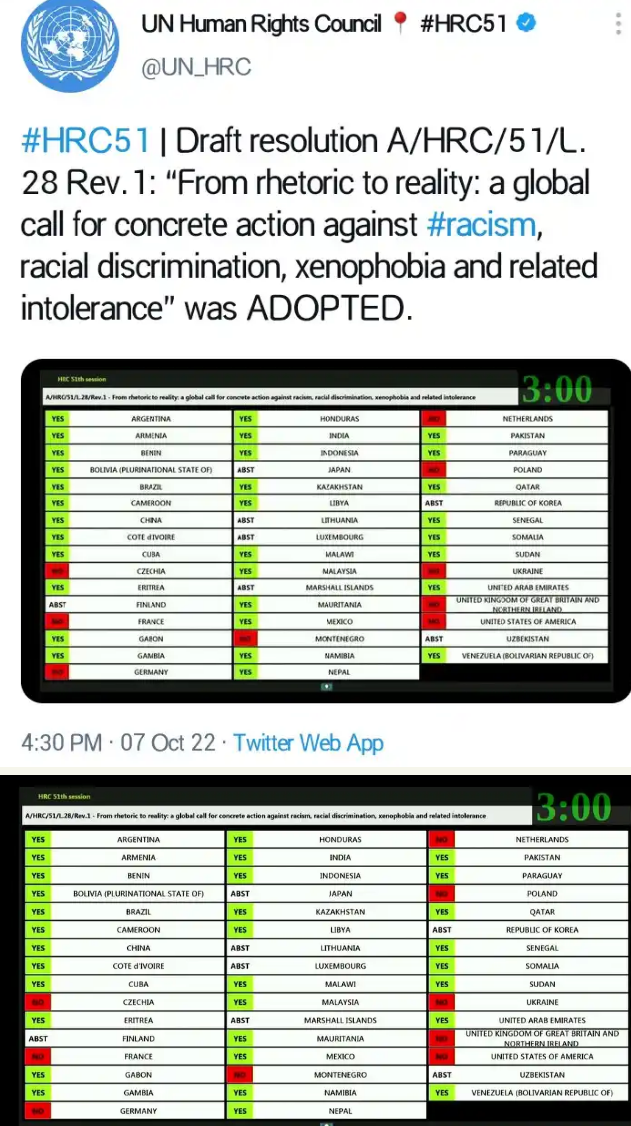
The 51st session of the UN Human Rights Council (held between 12 September – 7 October 2022) considered issues including systemic racism, enforced disappearances, climate change, water and sanitation, the rights of people of African descent, and colonialism, amongst others.
The United Kingdom, United States and Ukraine voted against a resolution to take action against racism at the fifty-first session of the United Nations Human Rights Council.
Countries that voted against the resolution include Czech Rep., France, Germany, Montenegro, the Netherlands and Poland. There were seven abstentions.
On Friday, the resolution titled ‘From rhetoric to reality: a global call for concrete action against racism, racial discrimination, xenophobia and related intolerance’ was tabled before the council.
On Friday, the United Nations Human Rights Council adopted 14 resolutions, extending mandates on Ethiopia, Burundi, the Bolivarian Republic of Venezuela, the Democratic Republic of the Congo, the Central African Republic, and Somalia.
The Council also adopted resolutions on the situation of human rights in the Syrian Arab Republic; strengthening the voluntary funds for the universal periodic review mechanism of the Human Rights Council; national human rights institutions.
Also was a global call for concrete action against racism, racial discrimination, xenophobia and related intolerance; promoting international cooperation to support national mechanisms for implementation, reporting and follow-up.
Lastly was an enhancement of technical cooperation and capacity building in the field of human rights; technical assistance and capacity building to address the human rights implications of the nuclear legacy in the Marshall Islands; and on technical assistance and capacity building for Yemen in the field of human rights.
SOURCE
SOURCE
UK gives reasons for voting NO
Mr. President, we remain resolute in our commitment to combating all forms of racism, racial discrimination and xenophobia and related intolerance whether that be at home or abroad. Discrimination of any kind has no place in society, and we will continue to treat all forms of discrimination with equal seriousness.
Nonetheless, we have a number of concerns with this text. We do not agree with the multiple references to the Durban Conference, given the historic concerns over antisemitism. And we cannot accept the references to the Durban Review Conference or the positive language regarding last year’s commemorative event in New York and its political declaration.
We do not agree with claims made in this resolution that states are required to make reparations for the slave trade and colonialism, which caused great suffering to many but were not, at that time, violations of international law. Moreover, these claims divert focus from the pressing challenges of tackling contemporary racism and global inequality – which are global challenges affecting all regions. We believe that the most effective way for us all today to respond to the cruelty of the past is to ensure that current and future generations do not forget what happened.
Mr. President, we stressed last year that the importance of the fight against racism requires that we move forward together on a common path. For that to happen, we must come together to find a new approach, one that focuses on what we are all individually and collectively going to do to combat the scourge that is modern-day racism. This draft resolution, however, does not offer the sort of new approach around which we can achieve consensus and for that reason we will vote against it.
We are committed to continuing a dialogue with the sponsors of this resolution and hope that we might be able to reach a different outcome in the future.
Thank you Mr. President.
Rita French
UK Human Rights Ambassador
Published 7 October 2022
SOURCE











he “international community” voted against anti-racism